
SHORT URL: http://tinyurl.com/Steele-Yale-6
On Thursday 6 February 2014 from 1800-1930, Robert Steele will address a group of undergraduates convened by Yale Politic. The event is free, open to the public without RSVP required, and the media has been invited.
Yale University, Branford College
Trumbull Room
74 High Street
New Haven, CT 06511
Downloadable PPT (30 Pages): Steele @ Yale
YouTube as Presented (Verbatim, Slides Not Really Visible)
Briefing as Planned Below the Line in Full Text
See Also:
YALE The Politic Interviews Robert Steele
2014 Intelligence Reform (Robert Steele)

01 I am glad to be here with you. This briefing consists of 30 slides delivered in 30 minutes. My intent is to provoke thought.

02 As I lectured LtGen Dr. Brent Scowcroft one day, nothing we do matters UNLESS we devise a means of constructively influencing those who own the future.
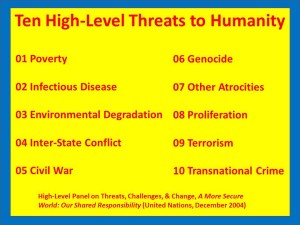
03 Dr. Scowcroft was the US representative on the UN High Level Panel that identified and prioritized the ten high level threats to humanity.
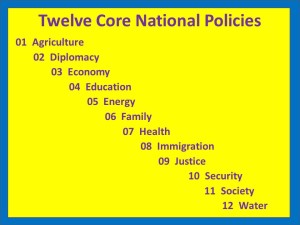
04 Most intelligence professionals obsess on the singular threat they have been assigned. In fact, intelligence support to strategy, policy, acquisition, and operations matters just as much.
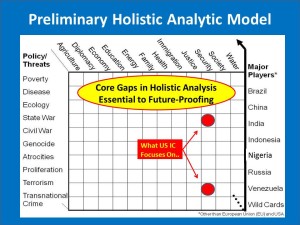
05 This is what a holistic analytic model looks like. All threats and all core policies however defined. Note that our government obsesses on the two red dots and ignores everything else.
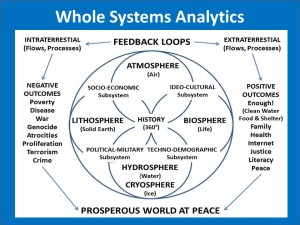
06 Whole Systems Analytics are essential if we are to avoid destroying ourselves. True cost economics is a foundation ignored by most universities. I hope you will embrace this as a foundation for all your future thoughts.
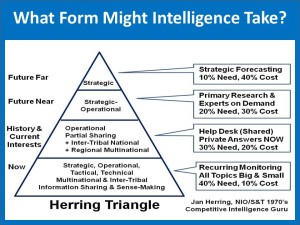
07 This is a simple look at what intelligence should be doing – four levels, with sharing being a very important attribute.
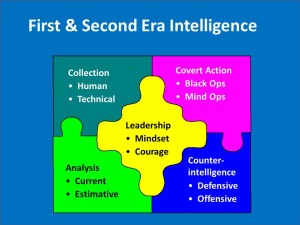
08 This is a very high level overview of the pieces of traditional intelligence – the first era of secret war and the second era of strategic analytics that was quickly swamped by clandestine and covert operations.
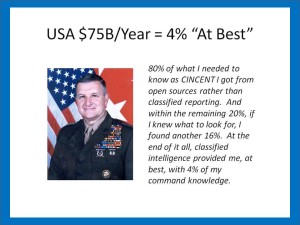
09 As we evaluate US national intelligence today – not just NSA but CIA and all the rest, General Tony Zinni’s comment is worthy of note.
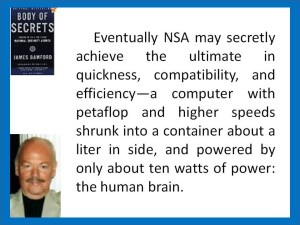
10 So also is Jim Bamford commentary valuable. NSA has not prevented a single terrorist attack – what is has done is spent hundreds of billions of dollars to little good effect.

11 In relation to all available relevant information in 183 languages we do not speak, this is a depiction of what the secret world touches.
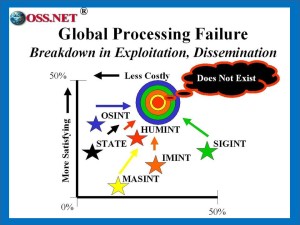
12 Unfortunately, and this does includes NSA’s mass surveillance program, we process virtually nothing of what we collect. Still today, the secret world is a cut and paste community mired in old technologies and techniques.
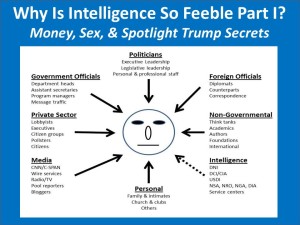
13 Intelligence is feeble in part because its voice is drowned out by all those with greater political, economic, and social influence over any given policy maker.
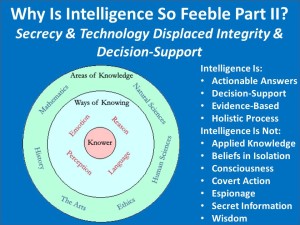
14 Intelligence is also feeble because the cult of secrecy has displaced integrity, and spending on technical collection has displaced decision-support. The secret world moves money, it does not “do” decision-support.
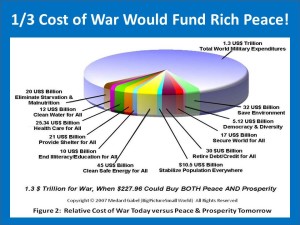
15 By way of transition, this is what we all spend on war – and as calculated by Medard Gabel, long-time adjunct to Buckminster Fuller – a depiction of how we could resolve all global issues for one third of that amount.
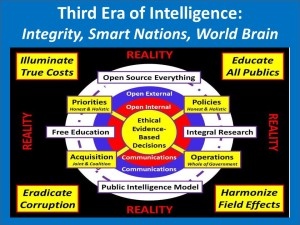
16 This is what intelligence is supposed to be doing:
– Illuminating true costs;
– Educating all publics;
– Eradicating corruption;
– Harmonizing field effects – in other words, constructively influences how others spend $.
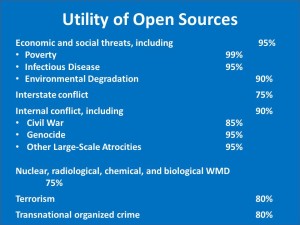
17 A major short-coming of the secret world is that it refuses to be serious about open sources of information. Here I show the utility of open sources in relation to the 10 threats (by my estimate).
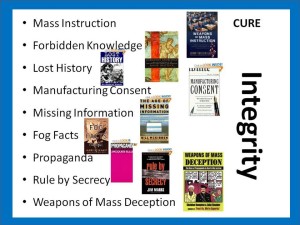
18 Even if we were to embrace the need to access all relevant information, there are obstacles. Each of these is also the title of a book on that specific topic.
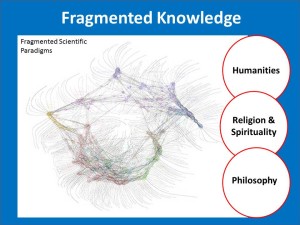
19 We have also allowed universities to fragment knowledge. Scientific disciplines are isolated from all others, and isolated from the humanities, religion & spirituality, and from philosophy.
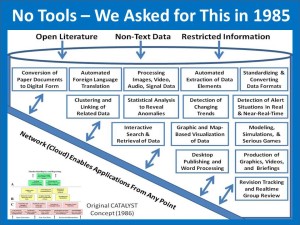
20 On top of our challenges in the source arena, we still do not have serious desk-top toolkits. This is what our best analysts asked for at CIA in 1985 – we still do not have this!
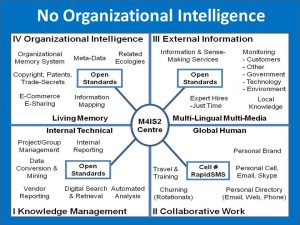
21 We have also failed to achieve organizational intelligence as defined by Harold Wilensky in the mid-1960’s. Most are in Quadrant I, a few in Quadrant II, virtually no one is in Quadrant III, and I know of no one at all in Quadrant IV.
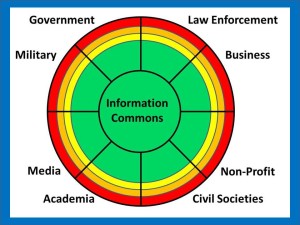
22 We begin to heal ourselves by recognizing that government is the least important information tribe, and that we must unify the eight tribes. We must create a culture of sharing across these eight tribes.
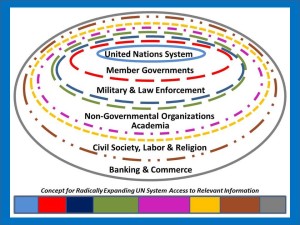
23 Here is a depiction from over a decade ago on what we might accomplish – each circle shows a larger and larger cache of content and a larger and larger investment. Sadly, this does not exist today.
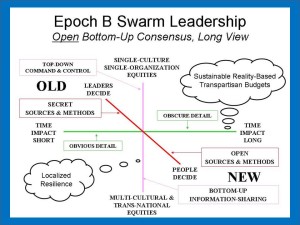
24 Just as we must unify the eight tribes, so also must we return to the best practices of the indigenous tribes – bottom up consensus taking the long view is vastly more affordable and more sustainable that elite decisions made in secret.
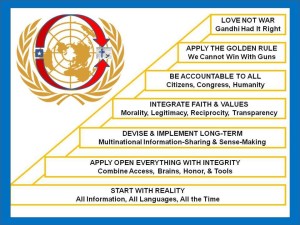
25 Ethics is completely absent in most of what our government does and in most of what our corporations do. I’m not happy with our non-profits or universities either. This is my proposed plan.
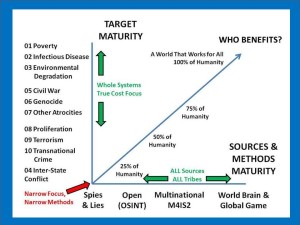
26 Here I bring together the ten threats and our existing approach, spies & lies. Here I show the alternatives we can explore that leverage both open sources and multinational sharing and sense-making.
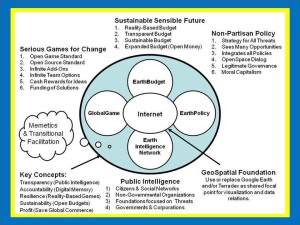
27 Investments are needed. This is the six bubble concept developed by Earth Intelligence Network. With technology that exists today, we can displace dishonest elites and make all public decision both evidence-based and transparent.
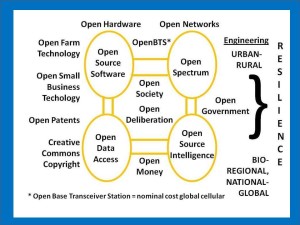
28 Multinational information sharing and local to global information sharing demand a global architecture that is affordable, inter-operable, and scalable. Open Source Everything!
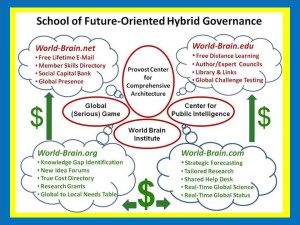
29 In my view, the best way to start this revolution in intelligence affairs is to find one great university whose president or provost can embrace this plan.
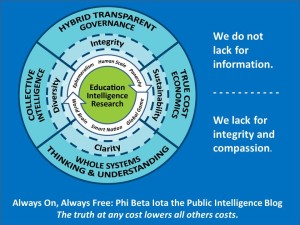
30 This is a summary graphic of the method that I and a few others are championing. We do not lack for information. We lack for integrity and compassion. THANK YOU.
About the Speaker:



